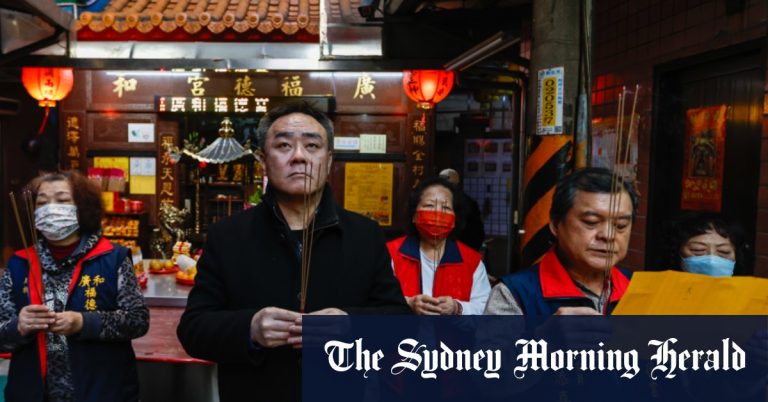The temple is also one of a series of religious institutions in Taiwan identified as being linked to the United Front, the Chinese government's sprawling international network of influence operations.
Liang, a 21st-generation descendant of the Hakka people of southern China, longs for the unification of Taiwan and the motherland – but not on the Chinese government's terms.

Liang at Guanghe Fude Temple in Taipei.credit: Daniel Singh
“Taiwan has always been China, and when we look at our ancestors, our past generations, they all actually migrated from mainland China. So the crux of the question is that we are actually Chinese people.”
Liang's travails represent the dilemma facing Beijing. His heart belongs to the mainland, but his head tells him that unifying the two neighbors is politically impossible.
Philosophical sentiments rippled throughout Taiwan. In Tainan, a two-hour high-speed train ride from Taipei, businesswoman Frankie Kuo says the Taiwanese and Chinese people are “part of the same family” and that Taiwan's ambiguous international status has not given it the results it needs in the global economy. But unification with the mainland under Xi is not worth the cost.
“There is no freedom at all there,” she said.
The more Beijing-friendly Kuomintang (KMT) is hoping to stop a record third term for the Democratic People's Party (DPP) in Taiwan's presidential election this weekend.
The Democratic Progressive Party, which fiercely defends Taiwanese sovereignty without formally declaring independence from China, has been in charge during the sharp downturn in relations with Beijing, mostly triggered by Chinese military threats toward its democratic neighbour.
China's Taiwan Affairs Office said a DPP victory would continue to follow the “evil path of provoking independence” and would take “Taiwan farther away from peace and prosperity, and closer than ever to war and decline.” Beijing warned voters on Friday against making the “correct choice”, saying the party's candidate was dangerous.
But even the Kuomintang, which claims the opposite in theory – China as part of Taiwanese territory – has no intention of uniting with the mainland. Party leaders fled to the island after the Chinese Civil War and have maintained their claim to the mainland ever since.

Kuomintang supporters take part in a political rally in Taipei on Friday.credit: Daniel Singh
The prospect of unification, which once had the support of a small minority, has now become such a fringe endeavor in Taiwan that it is difficult to find anyone except a small handful of older men who would openly support this goal.
One of them is Qi Jialin, head of the Alliance for the Reunification of China. In his office in downtown Taipei, Chi is nervous about speaking out about the election because he fears he will be targeted for his pro-unification views. However, once he gets down to business, it is clear that he sees Taiwan's future as being with Beijing.
To get to that point, Chi says, Taiwan needs to start building closer economic ties with the mainland. He cites Germany in the nineteenth century as an example of successful unification.
“The Kingdom of Prussia was based on economic relations. So we can see based on history that economics and cultural exchanges can deepen relations.

Chairman of the Alliance for the Reunification of China, Qi Jialin.credit: Daniel Singh
But in his ideal version of Taiwan, one partner has more power than the other. “There is no other option but to implement one country, two systems,” he said, referring to the same model that China uses to govern its territories in Hong Kong and Macau, both of which have seen all political resistance effectively eliminated over the past. Three years.
“The only difference is that Taiwan has [presidential] elections. “If Taiwan is unified, leaders will be elected through negotiations,” he added. “Taiwan should be able to enjoy a high degree of autonomy excluding these kind of separatist supporters.”
Xi's message does not resonate with voters in Taiwan. Less than 2 percent support unification as quickly as possible, and a small fraction of those support Xi's version of Chinese hegemony.
This compares to one in five who want the island to move toward formal independence, and more than 30 percent who want to maintain the status quo, according to monthly polls tracked by the Al Jazeera Research Center. National Chengchi University. In 1996, the number of people who wanted Taiwan to move toward unification reached 19.5 percent.

Democratic Progressive Party supporters attend a political meeting in Taipei on Thursday. credit: Daniel Singh
Far from being a unifying figure, Xi has become the worst enemy of his dreams. China's most powerful leader since Mao Zedong was mentioned more than a dozen times by Democratic Progressive Party leaders at a rally for the party's presidential candidate Lai Ching-tei in central Taipei on Thursday evening.
“Do you think Xi Jinping will allow freedom? [for] Taiwan?” Democratic Progressive Party lawmaker Hsu Shu-hua shouted to tens of thousands of cheering fans. “My opponents are attacking me because they support Xi. I have to break these opponents.”

